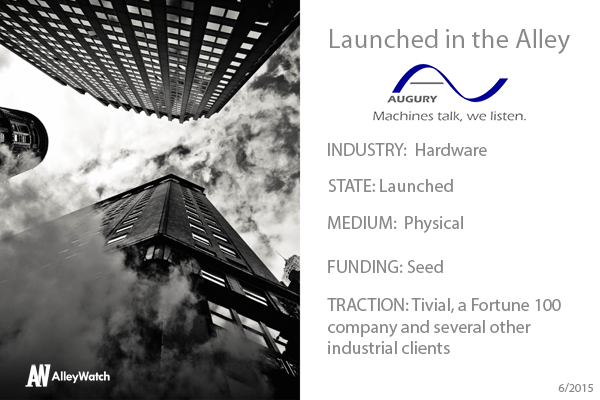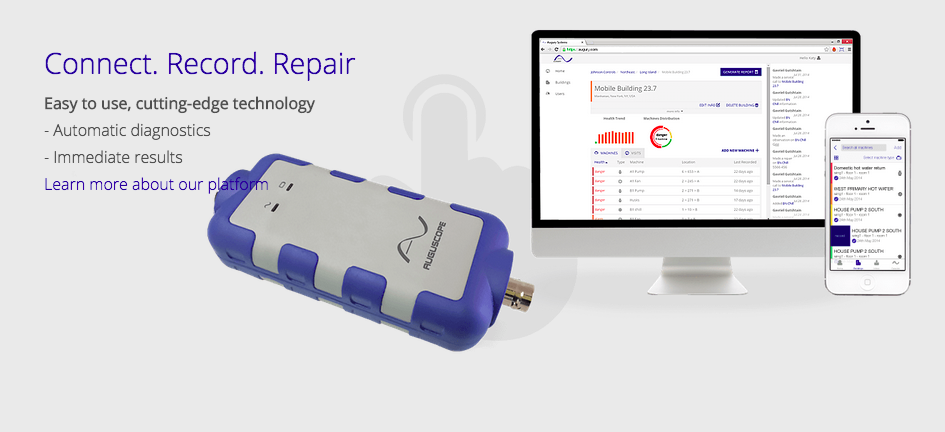Technology is not perfect by a long shot,machines do break down, and with more and more connected devices showing up in our lives every day, it won’t be that easy to diagnose where the precise malfunction is along the Internet of Things.
Augury is an Israel- and New York-based company that is bringing predictive maintenance technology to these new markets. And not a moment too soon.
Built on the idea that each machine has a unique acoustic footprint, Augury has developed technology that listens to the machine, analyzes the data, and catches any malfunctions, before they arise. The Augury solution can be applied to HVAC service companies and factories, as well as commercial facilities. No training necessary.
Oh, right, Augury is also building the mechanical diagnostics platform for the Internet of Things, and LererHippeau Ventures and First Round Capital (and Howard Morgan himself) are already investors.
CEO Saar Yoskovitz tells us about his new Diagnostics as a Service platform.
Tell us about the service.
Augury is building the mechanical diagnostics platform of the Internet of Things. We’ve developed technology that listens to machines and diagnoses them, based on the sounds that they make before any malfunction actually occurs. Augury’s solution promises thousands of dollars in savings to HVAC service companies, large-scale factories and commercial facilities. Eventually, Augury will provide a mechanical diagnostics platform for everything that has moving parts.
How is it different?
Augury brings internet-age technologies to a traditional market. By applying modern Big Data analytics, we enable true, real-time diagnostics of a machine’s health, without requiring any prior experience and training.
The “Auguscope” costs 10x less than existing predictive maintenance tools, while reducing analysis time by 10x. It brings the potential to deploy predictive maintenance on a larger scale and save companies tens of thousands of dollars per year.
What market are you attacking and how big is it?
Augury is focused on enabling predictive maintenance on a larger scale, starting with commercial facilities, while aiming at the rising Internet of Things. The U.S. Department of Energy has recently identified predictive maintenance as a viable investment, particularly in the commercial and the industrial setting. Government studies have indicated that an effective predictive maintenance program can provide up to 1000% in return on investment and reduce maintenance costs by up to 30%. The main downside, the DOE suggests, is that predictive maintenance can be extremely expensive, particularly when it comes to the cost of training personnel. This is where Augury comes in. Our technology eliminates much of the initial setup costs and reduces the need for labor or training. We are in the right place at the right time.
With the staggering rate of technology advancement, we expect the same market shift to happen on the residential and consumer side as well in the future, i.e. the Internet of Things. We are taking an active part in building and shaping that future.
What is the business model?
Our business model is similar to Software as a Service—we call it Diagnostics as a Service. The users pay a subscription per machine, or per device, and can record as much as they want.
What inspired the business?

While working in software development for a medical device startup, our co-founder, Gal Shaul, was sent to India to fix bugs in the company’s product, which contained pumps and fans. From across the room, he could hear that the fan’s filter was clogged up and he found himself ‘fixing the bug’ by washing the filters. Upon his return home, he contacted Saar Yoskovitz (who had extensive background in acoustic signal processing and machine learning algorithms) and asked if there is a way for the machine to understand from the sound that something is wrong. Just like that, Augury was born.
Can you tell us what is wrong with our founder’s Macbook Air? The S,W,2 and shift keys intermittently don’t work.
I’d have to bring in my Auguscope to see if it is a hardware issue. If it is, I’d be happy to direct you to our sales team. Otherwise, we might be dealing with something software-related. (I’d also suggest switching to a PC 🙂 )
What are the milestones that you plan to achieve within six months?
We recently launched our product with the largest HVAC service company in the U.S. (Fortune 100). We are currently working with a number of key players on integrating our continuous monitoring platform into their equipment. We are initially focusing on the commercial/industrial markets, but are simultaneously building a relationship with the largest smart appliance manufacturers, so we will be ready for the consumer IoT market when it arrives.
What is the one piece of startup advice that you never got?
Always plan two steps ahead, focus on the next step and be prepared to move one step back.
If you could be put in touch with one investor in the New York community who would it be and why?
Howard Morgan from First Round. It is an amazing firm and he is an even more amazing partner. His calm, to-the-point guidance helped us get where we are.
Why did you launch in New York?
Our market is high-rise commercial buildings, so New York was always at the top of our list. Plus, there is no better place to start than NYC!
We also took part in an “Israel2NYC” startup delegation that was organized by the NYCEDC. They gave us an extensive tour of the up-and-coming tech scene, and we were really impressed by the energy and atmosphere. They say ‘a rising tide lifts all boats;’ we want to be in the place that will best help us achieve our bold vision.
Where is your favorite outdoor bar in the city for a drink in the warm weather?
Compared to Israel, it’s never warm out, but I like the unique setting of The Frying Pan on Pier 66 because it’s always lively and it’s on an old boat. Pretty cool.





